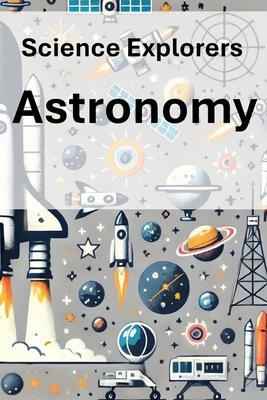
Book
Science Explorers: Astronomy: A Chemistry Curriculum for Middle School Students
(Write a Review)
Paperback
$6.99
Solar System
The Solar System includes planets and moons, with planets varying in size, composition, and distance from the Sun. Understanding the phases, surface features, and Earth's tidal influences of our Moon, alongside other moons, is crucial. Other celestial bodies such as asteroids, comets, and meteoroids, along with dwarf planets like Pluto and Eris, provide insight into the Solar System's diversity. Orbital mechanics explains how gravity governs the motion of celestial bodies, including elliptical orbits and gravitational influences.
Stars, Galaxies, and Cosmology
Stars form from nebulae and progress through stages like protostar, main sequence, and supernova, ending as white dwarfs, neutron stars, or black holes. Stars are classified by characteristics like color and luminosity, using the Hertzsprung-Russell diagram. Galaxies, including the Milky Way, come in types like spiral and elliptical. Cosmology covers the Big Bang Theory, universe evolution, and concepts like dark matter and dark energy, exploring theories about the universe's ultimate fate.
Space Exploration
Space exploration's history includes milestones like Sputnik and the Apollo missions, with contributions from NASA, ESA, Roscosmos, and CNSA. Human spaceflight achievements and challenges are highlighted through missions to the Moon and Mars. Robotic missions, such as Voyager and Curiosity, advance our understanding of the universe. The future of space exploration involves plans for Mars missions, asteroid mining, and potential human settlements on other planets, driven by technological and scientific advancements. Each section is divided into small, manageable parts that include:
Learning Objectives: Clear goals for what students should achieve.
Key Vocabulary: Essential terms with definitions to build foundational knowledge.
Explanations: Easy-to-understand explanations with accompanying diagrams to clarify complex concepts.
Questions: Thought-provoking questions to check comprehension and reinforce learning.
Home Tasks: Engaging, hands-on tasks that can be completed at home to apply what has been learned.
Solar System
The Solar System includes planets and moons, with planets varying in size, composition, and distance from the Sun. Understanding the phases, surface features, and Earth's tidal influences of our Moon, alongside other moons, is crucial. Other celestial bodies such as asteroids, comets, and meteoroids, along with dwarf planets like Pluto and Eris, provide insight into the Solar System's diversity. Orbital mechanics explains how gravity governs the motion of celestial bodies, including elliptical orbits and gravitational influences.
Stars, Galaxies, and Cosmology
Stars form from nebulae and progress through stages like protostar, main sequence, and supernova, ending as white dwarfs, neutron stars, or black holes. Stars are classified by characteristics like color and luminosity, using the Hertzsprung-Russell diagram. Galaxies, including the Milky Way, come in types like spiral and elliptical. Cosmology covers the Big Bang Theory, universe evolution, and concepts like dark matter and dark energy, exploring theories about the universe's ultimate fate.
Space Exploration
Space exploration's history includes milestones like Sputnik and the Apollo missions, with contributions from NASA, ESA, Roscosmos, and CNSA. Human spaceflight achievements and challenges are highlighted through missions to the Moon and Mars. Robotic missions, such as Voyager and Curiosity, advance our understanding of the universe. The future of space exploration involves plans for Mars missions, asteroid mining, and potential human settlements on other planets, driven by technological and scientific advancements. Each section is divided into small, manageable parts that include:
Learning Objectives: Clear goals for what students should achieve.
Key Vocabulary: Essential terms with definitions to build foundational knowledge.
Explanations: Easy-to-understand explanations with accompanying diagrams to clarify complex concepts.
Questions: Thought-provoking questions to check comprehension and reinforce learning.
Home Tasks: Engaging, hands-on tasks that can be completed at home to apply what has been learned.
Paperback
$6.99